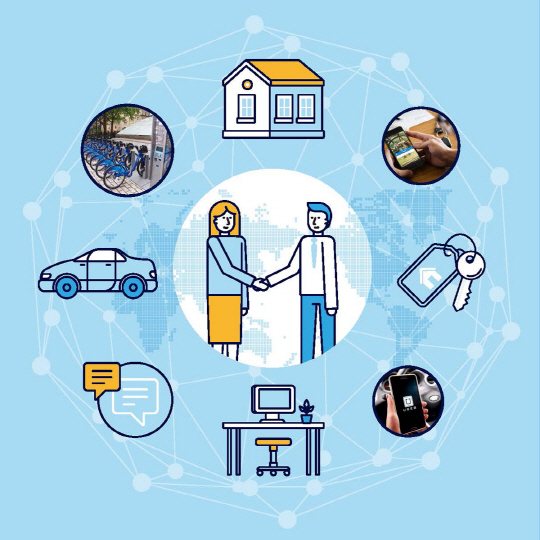공유경제(Sharing Economy)는 자원, 재화, 서비스 등을 소유자와 필요로 하는 사람 사이에서 공유하거나 교환하는 경제 모델입니다. 이는 주로 기술 플랫폼을 통해 이루어지며, 소유자의 자원을 효율적으로 활용하는 데 중점을 둡니다. 공유경제의 주요 개념과 요소를 자세히 설명하면 다음과 같습니다.

주요 개념
1. 자원의 효율적 사용: 공유경제는 자원의 유휴 시간을 줄이고, 필요할 때만 자원을 사용함으로써 효율성을 극대화합니다. 예를 들어, 자동차를 소유한 사람이 필요하지 않을 때 다른 사람에게 빌려주는 것이 대표적입니다.
2. 플랫폼 기술: 디지털 플랫폼은 공유경제의 핵심입니다. 이러한 플랫폼은 소유자와 사용자를 연결하고, 거래를 쉽게 관리할 수 있도록 돕습니다. 예를 들어, 에어비앤비(Airbnb)나 우버(Uber)는 이러한 플랫폼을 제공합니다.
3. 소유보다 접근: 공유경제는 물건을 소유하기보다 접근하는 데 초점을 맞춥니다. 이는 소유 비용을 줄이고, 다양한 자원을 필요한 순간에 사용할 수 있게 합니다.
주요 요소
1. 자원 제공자: 자신이 소유한 자원(예: 차량, 집, 도구 등)을 다른 사람에게 빌려주거나 공유하는 사람들입니다.
2. 자원 사용자: 자원 제공자가 제공하는 자원을 필요로 하는 사람들입니다. 이들은 일정한 비용을 지불하고 자원을 사용합니다.
3. 디지털 플랫폼: 자원 제공자와 자원 사용자를 연결해주는 중개 플랫폼입니다. 플랫폼은 예약, 결제, 평가 시스템 등을 제공합니다.
장점
1. 경제적 이익: 소유자는 유휴 자원을 대여하여 추가 수익을 창출할 수 있으며, 사용자는 저렴한 비용으로 자원을 이용할 수 있습니다.
2. 환경적 이익: 자원의 효율적 사용은 불필요한 생산과 소비를 줄여 환경에 긍정적인 영향을 미칩니다.
3. 사회적 연결: 공유경제 플랫폼은 사람들 사이의 연결과 신뢰를 증진시킵니다.
단점
1. 규제 문제: 공유경제는 기존 법규와 충돌할 수 있으며, 새로운 규제 필요성이 대두됩니다.
2. 품질 및 안전 문제: 제공되는 서비스나 제품의 품질과 안전성에 대한 보장이 어려울 수 있습니다.
3. 고용 안정성: 플랫폼 노동자는 전통적인 고용 형태보다 고용 안정성이 낮고, 사회적 안전망이 부족할 수 있습니다.
대표적 사례
• 에어비앤비(Airbnb): 개인이 소유한 집이나 방을 여행자에게 단기 임대하는 플랫폼.
• 우버(Uber): 개인이 소유한 차량을 이용해 택시 서비스를 제공하는 플랫폼.
• 위워크(WeWork): 사무실 공간을 공유하여 사용자가 필요한 만큼만 사용할 수 있도록 하는 플랫폼.
공유경제는 자원의 활용을 극대화하고, 새로운 경제적 기회를 창출하는 혁신적인 모델로 자리잡고 있습니다. 다만, 법적, 사회적, 경제적 문제를 해결하기 위한 지속적인 논의와 조정이 필요합니다.
The sharing economy is an economic model in which resources, goods, and services are shared or exchanged between owners and those in need, primarily facilitated by technology platforms. It focuses on utilizing owners' resources efficiently. Here's a detailed explanation of its key concepts and elements:
Key Concepts
- Efficient Use of Resources: The sharing economy maximizes efficiency by reducing idle time of resources and allowing them to be used only when needed. For example, a car owner can lend their vehicle when it's not in use.
- Platform Technology: Digital platforms are central to the sharing economy. These platforms connect owners and users, making transactions easy to manage. Examples include Airbnb and Uber.
- Access over Ownership: The sharing economy emphasizes accessing rather than owning goods. This reduces ownership costs and allows for the use of various resources as needed.
Main Elements
- Resource Providers: Individuals who lend or share their resources (e.g., cars, homes, tools) with others.
- Resource Users: Individuals who need the resources provided by the owners. They pay a certain fee to use these resources.
- Digital Platforms: Intermediary platforms that connect resource providers and users. They offer services like booking, payment, and review systems.
Advantages
- Economic Benefits: Owners can generate additional income by renting out idle resources, and users can access resources at lower costs.
- Environmental Benefits: Efficient use of resources reduces unnecessary production and consumption, positively impacting the environment.
- Social Connections: Sharing economy platforms promote connections and trust among people.
Disadvantages
- Regulatory Issues: The sharing economy can conflict with existing regulations, creating a need for new regulations.
- Quality and Safety Issues: Ensuring the quality and safety of services or products provided can be challenging.
- Job Security: Platform workers may experience lower job security and lack of social safety nets compared to traditional employment.
Representative Examples
- Airbnb: A platform where individuals rent out their homes or rooms to travelers for short-term stays.
- Uber: A platform where individuals use their cars to offer taxi services.
- WeWork: A platform that offers shared office spaces, allowing users to use as much space as needed.
The sharing economy is an innovative model that maximizes resource utilization and creates new economic opportunities. However, ongoing discussions and adjustments are needed to address legal, social, and economic issues.